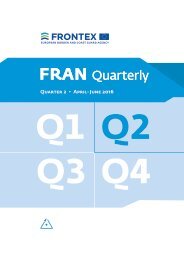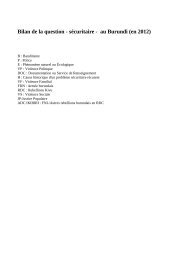You also want an ePaper? Increase the reach of your titles
YUMPU automatically turns print PDFs into web optimized ePapers that Google loves.
PUBLIC POLLING<br />
These findings clearly belie the notion that IS somehow represents the<br />
wave of the future for Sunni Arabs. One would never know it from the headlines<br />
about sensational terrorist incidents, but a popular uprising on behalf<br />
of the Islamic State is just plain implausible in any Arab country. If a power<br />
vacuum opens in a particular location, IS may try to fill it. But it will not be<br />
able to do so on the strength of public support.<br />
That’s the good news. The other news is that the marginal popular support<br />
for IS contrasts sharply with the substantial backing for certain other<br />
jihadist groups in many of the same Arab societies. This does not include al-<br />
Qaeda, whose support has plummeted from the 40–50 percent range in the<br />
early 2000s to the 10–20 percent range today. But the Muslim Brotherhood,<br />
for example, still registers around 25–35 percent popular approval—even in<br />
places like Egypt or Saudi Arabia, or the UAE, where it has recently been<br />
outlawed as a terrorist organization. Nor does the minimal appeal of IS mean<br />
many Arab Muslims want to “interpret Islam in a more moderate, modern,<br />
or tolerant way.” That question garners just 20 percent or less support in<br />
most Arab societies polled. Popular support for sharia, conversely, tends to<br />
be around 80 percent.<br />
The unmistakable inference is that one must measure support levels for<br />
particular groups, IS or otherwise, rather than for some abstract concept of<br />
Islamic fundamentalism or reform. And one should certainly not assume IS<br />
can trade on any underlying Salafi, sectarian, or similar sympathies to attract<br />
and maintain wide popular support. Among Arabs, at least, such an assumption<br />
would fly in the face of all the available hard data.<br />
Turning to the non-Arab large majority of Muslims, the picture is again<br />
surprising, but in a less pleasant way. As measured in a handful of 2014–16<br />
surveys, approval of the Islamic State is somewhat higher in several of these<br />
other societies, especially outside the Middle East. In Turkey, for instance,<br />
Pew polls show 8 percent expressing some sympathy with IS—a small<br />
minority, to be sure, but twice as large as in Arab polls, and representing<br />
several million Turks. In Pakistan, the situation is typically murkier.<br />
While very few there voice support for IS, the majority (62 percent) say<br />
they “don’t know” about it. From past experience with Pakistani polls, this<br />
probably means many would simply prefer not to answer such a politically<br />
charged question.<br />
Further east, in the equally large Muslim societies of Bangladesh or Indonesia,<br />
or in the small but active Muslim enclaves in the Philippines, polling<br />
data on this very timely question is, sadly, very scarce. Impressionistic yet<br />
63






